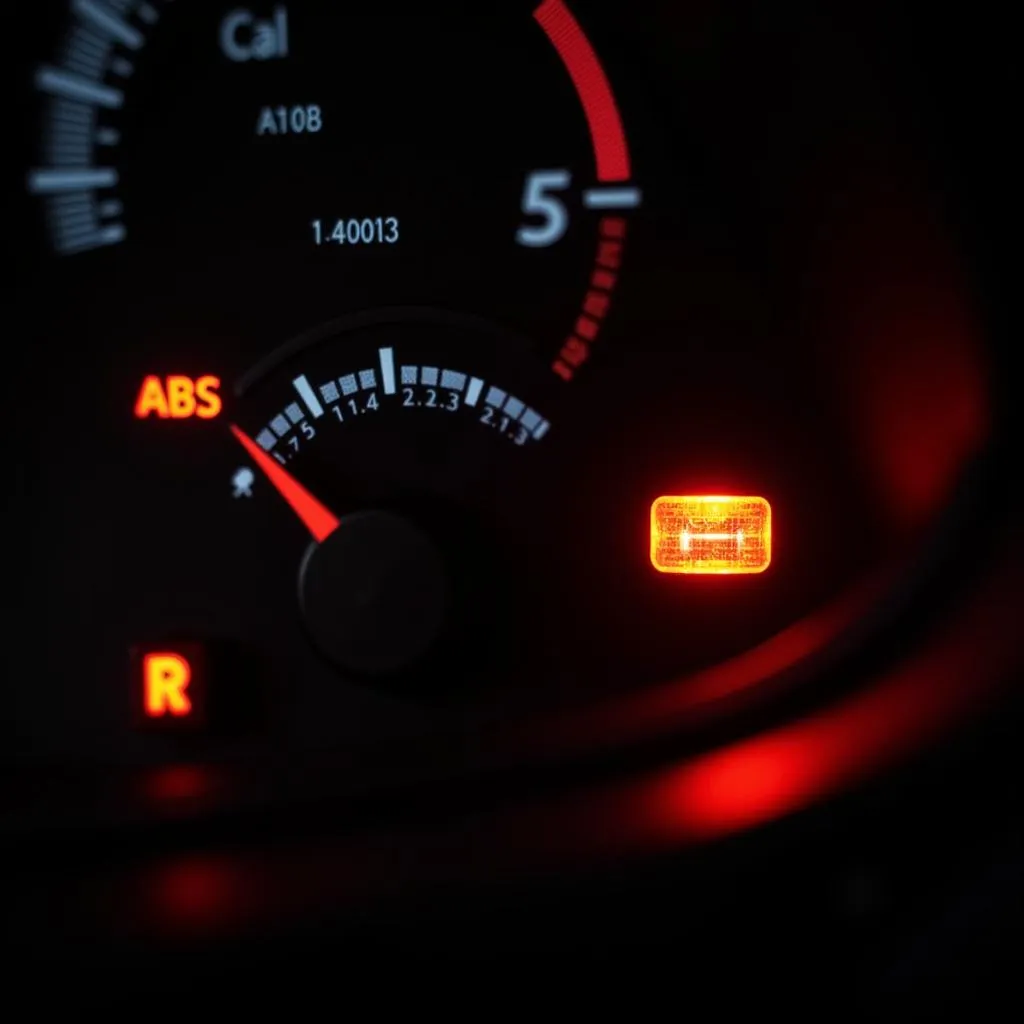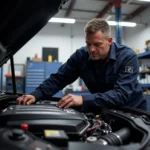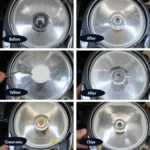A sudden illumination on your car’s dashboard can be unnerving. These warning lights, ranging from a simple check engine light to a more critical brake system alert, are your car’s way of communicating a problem. Ignoring them can lead to further damage, costly repairs, and even safety hazards. This guide will help you understand common car dash light issues and provide insights into effective car dash light repair solutions.
Deciphering the Dashboard: What Your Car is Trying to Tell You
Your car’s dashboard is equipped with various warning lights, each designed to signal a specific issue. While some lights indicate minor problems, others warn of critical malfunctions requiring immediate attention. Here’s a breakdown of common dash lights and their possible meanings:
- Check Engine Light: This ubiquitous light can indicate anything from a loose gas cap to a more serious engine problem.
- Brake System Warning Light: This light can signal low brake fluid, worn brake pads, or a malfunctioning ABS system. Immediate attention is crucial.
- Battery Light: This light typically indicates a problem with the charging system – a failing alternator, a loose battery terminal, or a dying battery.
- Oil Pressure Warning Light: This light warns of low oil pressure, which can lead to severe engine damage if ignored.
- Temperature Warning Light: This light signals that your engine is overheating. Pull over immediately to prevent damage.
Common Causes of Car Dash Light Issues
Car dash light problems can stem from a variety of issues, ranging from simple electrical glitches to more complex mechanical failures.
- Sensor Malfunctions: Sensors throughout your vehicle monitor various systems and trigger warning lights if they detect irregularities. A faulty sensor can trigger a warning light even if there’s no actual problem.
- Wiring Problems: Loose or damaged wiring can disrupt the communication between sensors, the car’s computer, and the dashboard lights, leading to inaccurate or false warnings.
- Faulty Components: A malfunctioning alternator, a failing water pump, or worn-out brake pads are examples of component failures that can trigger warning lights.
- Computer Malfunctions: While less common, issues with the car’s computer system can also lead to erroneous dash light warnings.
Car Dash Light Repair: Steps to Take
When a dashboard light illuminates, it’s essential to address the issue promptly. Here’s a step-by-step guide to handling car dash light repair:
- Consult Your Owner’s Manual: Your car’s manual provides a detailed explanation of each warning light and its urgency level.
- Assess the Severity: Determine if the situation requires immediate attention (like a flashing brake warning light) or if it can wait for a scheduled repair (like a consistently illuminated check engine light).
- Schedule a Diagnosis: For accurate diagnosis, visit a qualified mechanic specializing in car light repair Blacktown or your area. They have the expertise and diagnostic tools to pinpoint the root cause of the warning light.
The Importance of Professional Diagnosis
While some car owners might be tempted to diagnose and repair dash light issues themselves, professional diagnosis is always recommended.
“Modern vehicles are complex systems with intricate electronics,” says John Miller, a seasoned automotive engineer. “Attempting DIY repairs without the proper knowledge and tools can worsen the problem and lead to more costly repairs down the line.”
Preventive Measures: Keeping Your Dashboard Light-Free
While not all dash light issues are preventable, proactive car care can minimize their occurrence:
- Regular Maintenance: Adhere to your car manufacturer’s recommended maintenance schedule for oil changes, fluid checks, and overall inspections.
- Visual Inspections: Regularly inspect your car for any visible signs of leakage, wear and tear, or damage.
- Prompt Repairs: Address any minor issues promptly before they escalate into major problems.
Conclusion
Understanding your car’s dashboard lights is essential for safe and efficient driving. When a warning light illuminates, take it seriously and seek professional car dash light repair. Remember, a proactive approach to maintenance can prevent many dashboard light issues and keep your car running smoothly.
FAQs: Frequently Asked Questions about Car Dash Light Repair
Q: Can I drive my car with the check engine light on?
A: While driving with the check engine light on might be possible in some cases, it’s crucial to have the issue diagnosed promptly. Ignoring the light can lead to further damage and potentially leave you stranded.
Q: How much does car dash light repair cost?
A: The cost varies widely depending on the root cause. A simple sensor replacement might cost a few hundred dollars, while a major engine repair could cost significantly more.
Q: Can I use an OBD-II scanner to diagnose the problem myself?
A: While OBD-II scanners can read error codes, they don’t always pinpoint the exact problem. Professional mechanics use advanced diagnostic tools and their expertise to interpret the codes accurately.
Q: How often should I have my car checked for dashboard light issues?
A: It’s recommended to have your car checked at least once a year or as part of your regular maintenance schedule, even if no warning lights are illuminated.
Q: Can extreme temperatures affect my car’s dashboard lights?
A: Yes, extreme temperatures can sometimes affect the sensitivity of sensors and potentially trigger false warnings. However, it’s best to have any unusual dashboard light activity checked by a professional.
Need More Information?
Have more questions about car dash light repair or related topics like car brake light repair or how to repair brake lights car? Explore our website for more informative articles.
If you’re experiencing issues with your car’s dashboard lights, don’t hesitate to reach out. Contact us via WhatsApp at +1(641)206-8880 or email us at [email protected]. Our team of experts is available 24/7 to assist you.



